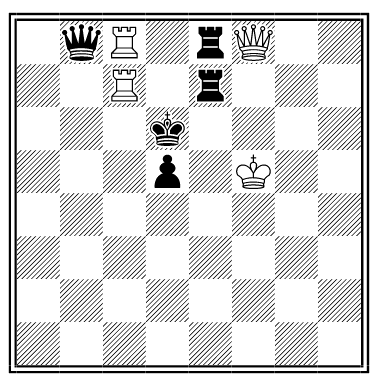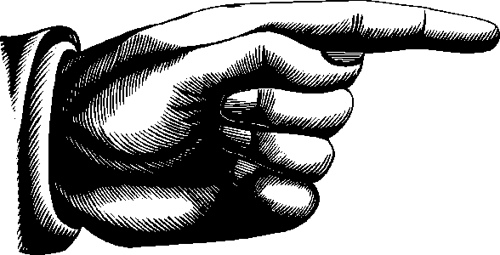
On the first anniversary of the 9/11 attacks, the winning numbers in the New York lottery were 9-1-1.

On the first anniversary of the 9/11 attacks, the winning numbers in the New York lottery were 9-1-1.
mislive
v. to lead a wicked life
Suppose that a person take an even number of coins or counters, or any such in one hand, and an odd number in the other, there is a simple method by which to tell in which hand the even number is. Ask the person to multiply the number in the right hand by an odd number, and the number in the left hand by an even number; then tell the person to add the two products together and tell you if the sum total be odd or even. If the sum be even, the even number is in the right hand, and if it be odd the even number is in the left hand.
— Miscellaneous Notes and Queries, January 1892

Vladimir Nabokov composed chess problems. Here’s a clever one from 1932: “White retracts its last move and mates in one.”
This is an instance of retrograde analysis: Of the many legal moves that White might just have made, only one can be revised to yield an immediate mate. Can you find it?

In his diary, Samuel Pepys tells of an odd feat performed by four little girls, who put “each one finger only to a boy that lay flat upon his back on the ground, as if he was dead: [at a signal] they did with their four fingers raise this boy as high as they could reach.” Pepys calls this “one of the strangest things I ever heard” but affirms that his friend Brisband witnessed it and saw the feat repeated on Sir G. Carteret’s cook, “who is very big.”
Strangely, I’ve found two other mentions of this. In Milledulcia (1857), his collection of selections from Notes and Queries, Robert Conger Pell notes that “a living man, lying on a bench, extended as a corpse, can be lifted with ease by the forefingers of two persons standing on each side, provided the lifters inhale at the moment the effort is being made.” “The inhalation of the lifters the moment the effort is made is doubtless essential.”
And in his Letters on Natural Magic (1883), David Brewster tells of an experiment in which “a heavy man is raised with the greatest facility, when he is lifted up the instant that his own lungs and those of the persons who raise him are inflated with air”:
The heaviest person in the party lies down upon two chairs, his legs being supported by the one and his back by the other. Four persons, one at each leg, and one at each shoulder, then try to raise him, and they find his dead weight to be very great, from the difficulty they experience in supporting him. When he is replaced in the chair, each of the four persons takes hold of the body as before, and the person to be lifted gives two signals by clapping his hands. At the first signal he himself and the four lifters begin to draw a long and full breath, and when the inhalation is completed, or the lungs filled, the second signal is given, for raising the person from the chair. To his own surprise and that of his bearers, he rises with the greatest facility, as if he were no heavier than a feather.
“As you have repeatedly seen this experiment, and have performed the part both of the load and of the bearer, you can testify how remarkable the effects appear to all parties, and how complete is the conviction, either that the load has been lightened, or the bearer strengthened by the prescribed process.”
I haven’t tried this myself, and for all I know it’s a joke or a stunt, but the accounts of Pepys and Brewster appear earnest and independent, and it seems unlikely that young girls could (or would) master a sophisticated illusion. I offer it here for whatever it’s worth.

In any given year, the dates 4/4, 6/6, 8/8, 10/10, and 12/12 fall on the same day of the week.
(Also 9/5, 5/9, 7/11, and 11/7.)
On May 19, 1780, the sky went dark over New England. From Portland, Maine, to southern New Jersey, candles were required between noon and midnight; frogs piped and evening birds sang.
In Connecticut, the state legislature adjourned because none could see to read or write. Col. Abraham Davenport opposed adjourning the governor’s council: “Either the day of judgment is at hand or it is not,” he said. “If it is, I wish to be found in the line of my duty.”
But the darkness lifted the following night. Probably it was really a combination of heavy clouds, fog, and smoke from forest fires.
Obituary of Angelo Faticoni (1859-1931), “The Human Cork,” New York Herald Tribune, Aug. 13, 1931:
Faticoni could sleep in water, roll up into a ball, lie on his side, or assume any position asked of him. Once he was sewn into a bag and then thrown headforemost into the water, with a twenty-pound cannonball lashed to his legs. His head reappeared on the surface soon afterward, and he remained motionless in that position for eight hours. Another time he swam across the Hudson tied to a chair weighted with lead. Some years ago he went to Harvard to perform for the students and faculty. He had been examined by medical authorities who failed to find support for their theory that he was able to float at such great lengths by the nature of his internal organs, which they believed were different from those of most men. Faticoni had often promised to reveal the secret of how he became ‘The Human Cork,’ but he never did.
“There is a tragic flaw in our precious Constitution, and I don’t know what can be done to fix it. This is it: Only nut cases want to be president.” — Kurt Vonnegut
TO BE LET,
To an Oppidan, a Ruricolist, or a Cosmopolitan, and may be entered upon immediately:The House in STONE Row, lately possessed by CAPT. SIREE. To avoid Verbosity, the Proprietor with Compendiosity will give a Perfunctory description of the Premises, in the Compagination of which he has Sedulously studied the convenience of the Occupant. It is free from Opacity, Tenebrosity, Fumidity, and Injucundity, and no building can have greater Pellucidity or Translucency — in short, its Diaphaneity even in the Crepuscle makes it like a Pharos, and without laud, for its Agglutination and Amenity, it is a most Delectable Commorance; and whoever lives in it will find that the Neighbors have none of the Truculence, the Immanity, the Torvity, the Spinosity, the Putidness, the Pugnacity, nor the Fugacity observable in other parts of the town, but their Propinquity and Consanguinity occasion Jocundity and Pudicity — from which, and the Redolence of the place (even in the dog-days), they are remarkable for Longevity. For terms and particulars apply to JAMES HUTCHINSON, opposite the MARKET-HOUSE.
— “Dub. News.,” quoted in Charles Carroll Bombaugh, Gleanings for the Curious from the Harvest-Fields of Literature, 1890